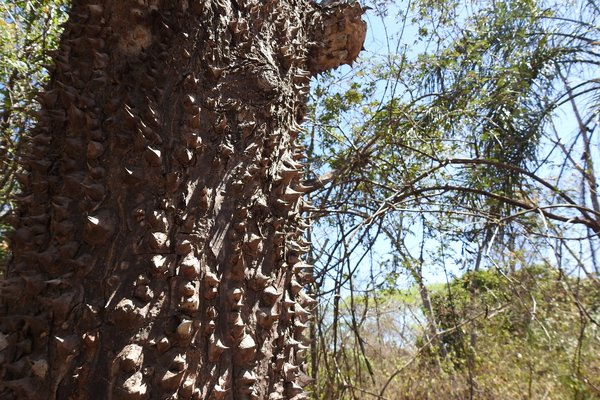Costa Rica
Guanacaste
The 'Area de Conservación Guanacaste' covers diverse landscapes and forest types, including a rare vast stretch of Pacific Tropical Dry Forest.
This ecosystem ranges from 12 miles into the Pacific Ocean, with its upwelling and coral reefs, to the coastal dry tropical forest and the lowland Caribbean rainforest it interacts. It is a habitat for threatened or rare fauna species like the False Vampire Bat, Olive Ridley Sea Turtle, Jaguar, and Mangrove Hummingbird.
Community Perspective: located in northern Costa Rica, not far from Liberia airport, this is a contiguous area of seven protected zones. Rincon de la Vieja National Park (Kyle, Patrik) is the most visited of those, while Horizontes Forestry Experiment Station (Els) is easily accessible too.
Site Info
Official Information
- Full Name
- Area de Conservación Guanacaste (ID: 928)
- Country
- Costa Rica
- Status
-
Inscribed 1999
Site history
History of Guanacaste
- 2004: Extended
- To include the Sector Santa Elena
- 1999: Inscribed
- Inscribed
- Type
- Natural
- Criteria
- ix
- x
Links
- UNESCO
- whc.unesco.org
- Official
-
- acguanacaste.ac.cr — Sector Santa Elena
- acguanacaste.ac.cr — Sector Junquillal
- sinac.go.cr — Parque Nacional Santa Rosa
All Links
UNESCO.org
- whc.unesco.org — whc.unesco.org/
Official Website
- acguanacaste.ac.cr — Sector Santa Elena
- acguanacaste.ac.cr — Sector Junquillal
- sinac.go.cr — Parque Nacional Santa Rosa
- sinac.go.cr — Parque Nacional Rincón de la Vieja
- acguanacaste.ac.cr — Horizontes Forestry Experiment Station
- areasyparques.com — Parque Nacional Guanacaste
News Article
- June 29, 2021 ticotimes.net — Rincón de la Vieja Volcano registers strong eruption
- Dec. 12, 2016 news.co.cr — Access to Costa Rica National Parks in Guanacaste reopen after Hurricane Otto
Community Information
- Community Category
- Natural landscape: Forest
- Natural landscape: Marine and Coastal
Travel Information
Reservation required
Recent Connections
-
Incorrect UNESCO 'Number of locations'
UNESCO reports none, which suggests it …
-
Perfect Inscriptions
1999 -
Over 100 mammal species
Guanacaste NP alone includes 140 specie…
Connections of Guanacaste
- Geography
-
-
Estuary
"(...) a diverse coastal-marine ecosystem containing important coral reefs, algal beds, estuaries, mangroves, sandy and cobble beaches, shore dunes and wetlands." (Official description - Crit ix) -
Pan-American Highway
-
Pacific Ocean
-
Crater Lakes
on the case of the Rincón de la Vieja volcano, there are two lagoons on craters, the one on the main active crater (a termomineral, hot lagoon) and the one on the Crater #5, also called Jilgueros Lagoon, a cold water lagoon in a densely forested area. Additionally, the Santa María volcano also has a lagoon. -
Hot Springs
Rincon de la Vieja National Park -
Pacific Ring of Fire
in general, the Costa Rican territory is in the Pacific Ring of Fire and is subject to earthquakes and volcanic eruptions. As such, the territory was formed because of the subduction of the Cocos plate under the Caribbean plate, forming the existing mountain ranges. The Guanacaste CA has one of the -considered- active volcanoes. Additionally, the Cocos Island NP is the highest point on the Cocos submarine mountain range, on the Cocos plate, has an extinct volcanic mount (Iglesias peak) and will eventually subduce under the Costa Rican territory. -
Recently Active Volcanoes
Rincón de la Vieja - last erupted in June 2017 (including lahars that descended through some rivers on the northern side of the volcano).See www.nacion.com
-
- History
-
-
Sieges and Battles
Santa Rosa historic mansion was the site of battles in 1856, 1919 and 1955, but the most important was during the 1856-1857 National Campaign against the "Filibusteros", a group of mercenaries from the US and Europe that believed in the doctrine of the "Manifest Destiny" and after taking power in Nicaragua, intented to establish an English-speaking slavery state in all of Central America, very much on the style of the Southern US states. After their victory, the Costa Rican army proceeded to attack the city of Rivas, in Nicaragua.See en.wikipedia.org
-
- Ecology
-
-
Sea Stacks
Roca Bruja in Santa Rosa National ParkSee www.google.com
-
Coral
In the marine area, there are coral reefs, some containing species that are unique in the Pacific Oriental (Coastal WHS) -
Dunes
Pleistocene dunes occur, with ages estimated in 17000 years (Coastal WHS) -
Turtles and tortoises
Habitat of Olive Ridley sea turtle, Leather Back sea turtle
-
Mangroves
-
Crocodiles
-
Tapirs
Baird's tapir -
Sloths
brown-throated sloth, two-toed sloth -
Anteaters
silky anteater, northern tamandua -
Biological Corridor
Mesoamerican Biological Corridor -
Jaguar habitat
-
Tropical and subtropical dry forests
"The many forest types comprise a large tract of tropical dry forest" (OUV) -
Over 300 bird species
"Among some 500 bird species are..." (crit X) -
Pelicans
Brown -
Over 100 mammal species
Guanacaste NP alone includes 140 species of mammals (wiki)See en.wikipedia.org
-
Stratovolcanoes
there are two main volcanic complexes in the inscribed area, that each include various stratovolcanoes: the Orosí-Orosilito-Cacao complex in Guanacaste NP and the Rincón de la Vieja-Santa María complex in the Rincón de la Vieja National ParkSee es.wikipedia.org
-
- Damaged
-
-
Affected by Climate Change
Climate change is threatening the heritage site. It is changing the altitudinal migration between the dry forest and the humid mountains of some species of birds, insects, and mammals (Colette 2009). The migration is expected to increase in coming years. Climate change has also reduced biodiversity in recent years. (Coastal WHS) Also Coral bleaching.
-
- World Heritage Process
-
-
Incorrect UNESCO 'Number of locations'
UNESCO reports none, which suggests it is a single contiguous area. However, Junquillal Wildlife Refuge is clearly a separate component. Also, there is a mysterious component in the south (with a spot called Puesto La Virgen) which has appeared after the extension of the site in 2004.
-
Extended
2004: To include the Sector Santa Elena -
Perfect Inscriptions
1999
-
- WHS on Other Lists
-
-
Plant WHS not in a CPD
"Coexisting in the property, there are more than 7,000 species of plants, as diverse as Mahogany in the lush forests and several species of agaves and cacti in drier areas." (OUV) -
World Heritage Forest Programme
-
Ramsar Wetlands
Manglar de Potrero Grande + Laguna Respringue -
Biodiversity hotspot
Mesoamerica
-
- Timeline
-
-
Cretaceous
The geological diversity is also of interest. It has 24,000ha of a serpentine barren (periodyte) on the Santa Elena Península, which has existed for more than 85 million years above sea level. It has pyroclastic areas in Santa Rosa NP (Miocene) and Pleistocene volcanic complexes in the region of the Orosi and Cacao volcanoes (Guanacaste NP) (AB ev)
-
- Visiting conditions
-
-
Foreigner prices
Santa Rosa National Park: Residents: ₡1.100 (not including $2 camping costs per night); Non-residents: $15 (not including $2 camping costs per night, ₡8.457 at today's exchange rate). Guanacaste National Park: Residents: ₡1.100; Non-residents: $15 ( ₡8.457 at today's exchange rate). Rincón de la Vieja National Park: Residents: ₡1.000; Non-residents: $15 ( ₡8.457 at today's exchange rate). Bahía Junquillal Wildlife Refuge: Residents: ₡2.000 (not including camping costs); Non-residents: $19 ( not including camping costs, ₡10.712 at today's exchange rate). Horizontes experimental station: Residents: ₡1.000 (not including lodging); Non-residents: $10 (not including lodging costs, ₡8.457 at today's exchange rate). -
Reservation required
A visit has to be reserved online beforehand (can be done shortly before).
-
News
- ticotimes.net 06/29/2021
- Rincón de la Vieja Volcano registe…
- news.co.cr 12/12/2016
- Access to Costa Rica National Park…
Recent Visitors
Visitors of Guanacaste
- A. Mehmet Haksever
- Ammon Watkins
- AndreaTLV
- Atila Ege
- Badwater
- basementonline
- beckyjo27
- Bram de Bruin
- Carlos Sotelo
- Cholden324
- Christoph
- Cobaltrage
- crilly
- Don Irwin
- Els Slots
- Erik Jelinek
- Eva Kisgyorgy
- Frederik Dawson
- Gary Arndt
- Harald T.
- H Beswick
- Hughes1920
- Iain Jackson
- IreneKD
- Jarek Pokrzywnicki
- João Aender
- Jon Opol
- Justin Rickey
- KarenBMoore
- Kelly Rogers
- kelseyyurek
- Kevin McFarland
- Kim, Soo-youn
- KreneH
- Kyle Magnuson
- laris.kowal
- leroykstlj
- Little Lauren Travels
- Loic Pedras
- Luis Filipe Gaspar
- Lukemarshall
- Malgorzata Kopczynska
- Mardigny
- Martin
- Michael Ayers
- Mikko
- Milan Jirasek
- MMM
- Morodhi
- MWaters66
- Nihal Ege
- Pat Martin
- Patrik
- Philipp Leu
- pressdm
- Reisedachs
- Reza
- rivr
- Roel Sterken
- Roger Ourset
- Roman Bruehwiler
- sbshipway
- Sergio Arjona
- Sutul
- Thomas Buechler
- Tommy W
- tony0001
- Toxicologist
- Walter
- Waters88
- Waxwing
- Weecheng
- Zoë Sheng
Community Reviews
Show full reviews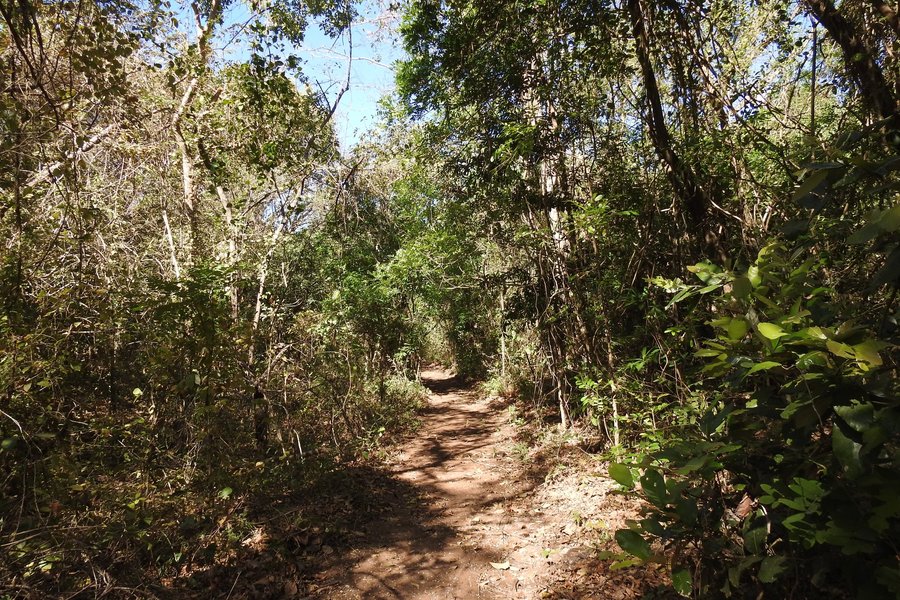
Guanacaste is a large area in northwestern Costa Rica that is easily accessible from the Liberia Airport, which has nonstop flights to many U.S. airports. Needing a short break to a warm climate, I hopped on a last-minute flight to Costa Rica to visit this World Heritage Site. Over 48 hours split over three days, I managed to visit three different areas of the vast site. Although the site is huge, most parts are within a two hour drive of the Liberia airport, off the Pan-American Highway; which is pretty well maintained.
The site is a broad Conservation Area of at least seven different national parks/reserves under separate administration that are generally disconnected, at least as far as the human entrances are concerned. Planning is essential, and so based on reviews here, the trusty Lonely Planet Guide, and a perusal of the website, I picked three areas to visit. The reviews on here were immensely helpful in describing the different areas of the park, so I wanted to leave my own to hopefully help future travelers.
After arriving at noon, I picked up a rental car nearby Liberia Airport and set off for Refugio Nacional de Vida Silvestre Bahia Junquillal, which was about a 90-minute drive. This area is a national reserve that consists of a wide beach where families visit and camp. I did a walk on the beach along the bay and also a short nature trail through the woods. There were plenty of people but …
Keep reading 0 comments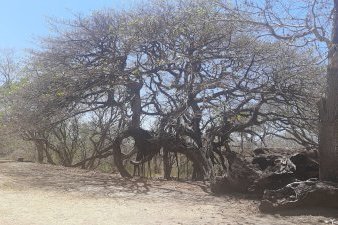
I stayed three nights in Liberia in March 2024 and used the full first day to visit the Rincon de la Torre national park. I took an uber taxi there for around $22. The driver gave me his number in case I needed a pickup for the way back at the going rate of $30.
One has to book the tickets online, they cannot be bought at the park itself, though there is wifi and it shouldn't be a problem to book there for the same day.
I was there a bit before 8am and I had to wait to be registered. It was a windy day and I started off with the trail to the waterfalls. There are several karst phenomena, such as an underground river shortly coming to surface.
The hike up to the Hidden Waterfall was quite steep plus the wind was so strong that it was difficult to keep my balance on the rocks. Also, there was a spray of water a few times, and I wasn't sure if it was from the clouds or from the river. In any case, this mountain wind is partly responsible for the dryness on this side of the mountains, so I considered myself lucky to be able to experience this feature of the world heritage site so intensely. The last part down to the waterfall was steep, but there is a rope. I hadn't met anyone so far but was soon joined by a family. The …
Keep reading 0 comments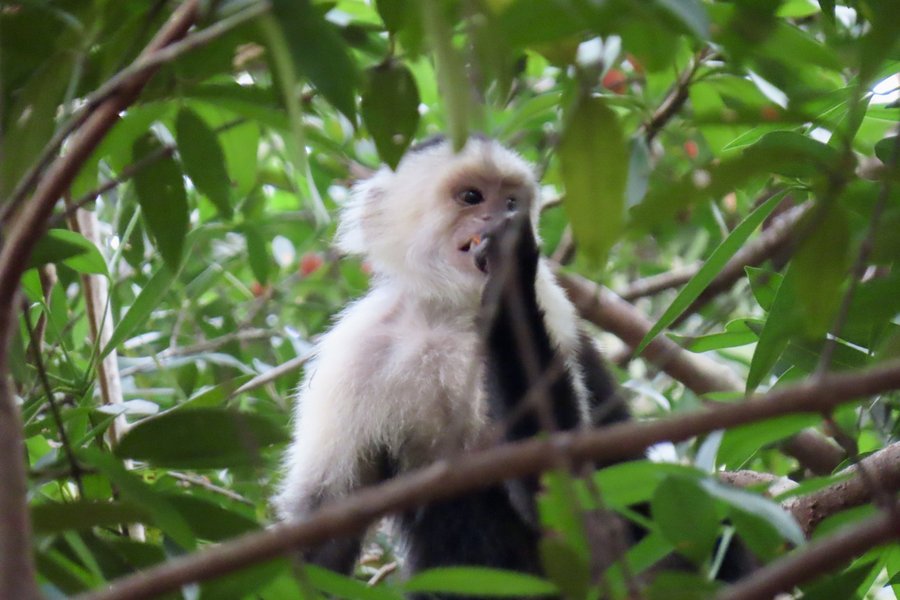
I dedicated 3 days to exploring the Area de Conservación Guanacaste in March 2024. Every day we made sure to arrive at the park gate when it opened at 8am (pay attention to which parks are open each day). Our logic was - do the hike in the morning (avoid peak temperatures), higher potential of spotting wildlife, and to finish in time for a late lunch. In the end, we felt we succeeded as we arrived to all parks between 8:00 and 8:30 in the morning, the heat was not uncomfortable, and we did indeed spot plenty of wildlife. Access to each park was reserved in advance online, with the exception of the Junquillal Sector.
Day 1: Monday - Santa María Sector
Day 2: Tuesday - Pailas Sector
Day 3: Wednesday - Santa Rosa Sector & Junquillal Sector
In our Toyota Cross SUV rental, every drive was fine. However, I will note the road to the Santa María Sector is the most difficult. Unfortunately, once you're a few kilometers outside of Liberia you pass by a dumpsite for the city that is an unpleasant reminder of the challenges of Waste Management in the country and the effects of mass tourism. The last few kilometers to Santa María Sector are particularly bumpy and should not be attempted in a sedan car. Not long before the gate entrance we spotted a red Coati, our first mammal!
Santa María Sector, Rincón de la Vieja Volcano National Park
Santa María Sector is wonderfully …
Keep reading 0 comments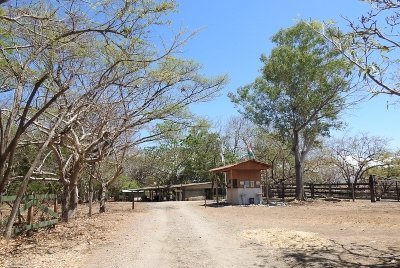
Like Talamanca, Guanacaste is a vast area whose value is hard to summarize in one phrase. One can easily spend days visiting its specific features, its OUV ranges from the marine (turtle nesting sites) to the terrestrial with dry tropical forests and much more. I am only the third reviewer on this website, 11(!) years after the last one. However, parts of the included area close to Liberia are quite popular with beach tourists that mostly come from the USA.
There’s a similar choice to make as with Talamanca as to which included area to visit. The WHS comprises a contiguous area of seven protected zones. I did a half-day visit from Liberia to “Horizontes Forestry Experiment Station”. I had also wanted to add a stay near “Rincon de la Vieja National Park” (probably the most touristy part), but a rescheduling of my flight back to Europe forced me to cut my stay short.
Horizontes was a late discovery during my preparations. It needed pre-booking for Covid reasons as well, however, the process wasn’t as smooth as with other parks in Costa Rica. Payment could only be done by bank transfer in USD (15) or colones, for which my bank asked a 50 EUR fee. Fortunately, Wise did it much cheaper.
This former cattle ranch has been turned into a cultivation site for native forest species and their associated forest ecosystems. It lies almost directly behind Liberia airport. Only the final 4km is on a dirt road …
Keep reading 0 comments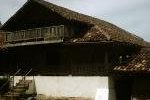
Guanacaste Conservation Area is in the northeastern cantones (counties) of Liberia, La Cruz, Bagaces and Upala, spanning between the provinces of Guanacaste and Alajuela. This area comprises three national parks: Rincón de la Vieja Volcano NP, Guanacaste NP and Santa Rosa-Bolaños island NP, the recreational area of Junquillal, Horizontes experimental station and some smaller protected areas.
The particularity of this part of the country, regarding the rest of the country, is it´s drier climate to the pacific side of the mountain slopes. So, it´s considered the last relict of the dry tropical forest that sometime covered from Guanacaste to southern Mexico. With this respect, it´s the largest area to include such forest. It also has some other important aspects: the large biodiversity that it houses, somewhat different to what is usual in the wetter parts of the country, the savanna-type vegetation, the presence of different species such as: deers, coaties, monkeys, armadillos, snakes, etc. The marine part is also particulary rich and pristine in terms of biodiversity.
Bolaños island is considered a sanctuary for marine birds, Junquillal and Naranjo beaches are extremely appreciated for their waves and rugged landscape, Santa Elena peninsula in Santa Rosa NP is the driest and geologically oldest part in the country and it´s in a great deal untammed by human action, Murciélagos islands are also representative of the historic and biological evolution of the area. Santa Rosa has the biggest section of dry forest, a mariine area, and coastal marshlands, and also has Nancite Beach, …
Keep reading 0 comments
Guanacaste is now very popular as a gateway to the resorts in northern Costa Rica. It has been explosive since the airport opened in Liberia and hotels like Four Seasons in Papagoya became chic.
There is much to do and I signed up for the zip line experience and horse back trail ride in the Rincon de la Vieja National Park. A highlight of the trail ride is a dip in hot springs in the forest.
The one other highlight is to get near Tamarine Beach to watch the Leatherback turtles come up and lay eggs on the beach. I do not think the beach is part of Guanacaste but no matter. The quantity of turtles are diminishing rapidly. Their shells are 5-6 feet and are amazing to watch in the middle of the night.
Keep reading 0 comments
